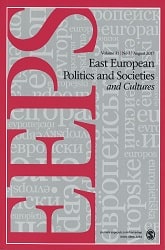Quelling Ukrainian Opposition in Interwar Poland: The Ministry of Interior’s Divide and Rule Strategy
Quelling Ukrainian Opposition in Interwar Poland: The Ministry of Interior’s Divide and Rule Strategy
Author(s): Daniel FedorowyczSubject(s): Political history, Government/Political systems, Politics and society, Interwar Period (1920 - 1939), Ethnic Minorities Studies, Sociology of Politics
Published by: SAGE Publications Ltd
Keywords: ethnic politics; interwar Poland; Ukrainian minority; political organizations;
Summary/Abstract: Interwar Poland has a less than stellar reputation for its treatment of minority ethnic groups, which was cause for concern, considering that nearly one-third of Poland’s population comprised minorities—particularly Ukrainians, Jews, Belarusians, and Germans. The existing historiography on this topic overwhelmingly uses a dichotomous pre- and post-1926 framework to analyze policies pursued by Warsaw. In this article, I take a new approach to understanding minority politics in the Second Polish Republic by disaggregating the level of analysis from group-level policies to focus on the dynamics between the Ministry of Interior (MSW) and political organizations that claimed to represent minority ethnic groups. Using the case of the Ukrainian minority, I explore how the MSW, both before and after the 1926 coup, and despite regime and ideological changes, still pursued a divide and rule strategy to manage Ukrainian opposition. This policy was carried out through the promotion and exploitation of the Ukrainian minority’s political heterogeneity, the creation of state-sponsored loyalist Ukrainian organizations, the activation of sub-ethnic group cleavages, and the banning of organizations that could credibly unite the Ukrainian opposition. By examining the full spectrum of organizations and the relationship of each with the state, this article sheds new light on old questions by moving away from regime types and ideology as the primary explanatory variables dictating minority politics, in turn revealing the more nuanced and tactical, rather than the ideological, approach pursued by the Ministry of Interior to the management of ethnic minority populations throughout the interwar period.
Journal: East European Politics and Societies
- Issue Year: 34/2020
- Issue No: 02
- Page Range: 351-374
- Page Count: 24
- Language: English
- Content File-PDF

